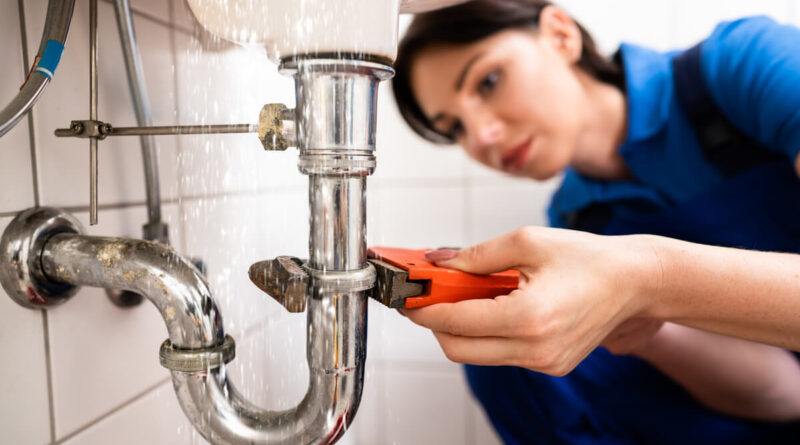Why Commercial-Plumbing Matters More Than You Think
When people talk about business success, they mention leadership, branding, or marketing. What often goes unnoticed is the silent role of infrastructure. One major part of that unseen system is plumbing. For any facility, whether it’s a restaurant, a hotel, a hospital, or an office, commercial plumbing plays a critical role in day-to-day operations.
This article explores the importance of proper commercial plumbing, how it differs from residential systems, and what businesses should consider when choosing plumbing services.
Understanding Commercial Plumbing: It’s More Than Pipes and Toilets
Unlike residential plumbing, which usually deals with small-scale systems, commercial-plumbing handles complex setups with high usage demands. Think about how many people use restrooms, kitchens, and water systems in a shopping mall or a high-rise office. That level of traffic places intense pressure on plumbing systems.
Commercial systems must support larger volumes, stricter safety regulations, and longer hours of operation. They are also more prone to wear and tear due to constant use. That’s why commercial plumbing requires different tools, materials, and experience.
Where You See It: Industries That Rely on Commercial Plumbing
You may not see it every day, but commercial plumbing supports nearly every industry:
- Hotels and resorts rely on it for smooth water supply to hundreds of rooms.
- Restaurants and cafes need efficient drainage, grease traps, and clean water systems.
- Hospitals and clinics depend on clean and regulated plumbing for hygiene and patient safety.
- Factories and warehouses often need industrial-grade plumbing systems for specialized use.
In all these settings, failure in plumbing can mean downtime, health risks, and in some cases, legal penalties.
Why Poor Plumbing Is Bad for Business
Plumbing problems are more than just inconvenient. They can have serious consequences for business operations. Some of the most common issues include:
- Clogged drains that lead to unpleasant odors and slow service
- Leaking pipes that increase utility bills and damage property
- Broken water heaters that affect customer satisfaction and employee comfort
- Sewage backups that can shut down a facility and invite health inspections
When customers see wet floors or smell sewer gases, they remember. And not in a good way.
The Benefits of Regular Maintenance for Commercial Plumbing
One of the smartest things a business can do is schedule regular plumbing maintenance. Here’s why:
Lower Long-Term Costs
A small leak might not seem urgent now, but over time it causes water damage, mold growth, and rising bills. Fixing a problem early costs far less than waiting for it to get worse.
Business Continuity
Maintenance reduces the risk of unexpected shutdowns. When your pipes are clear and your systems are reliable, you avoid the cost of closing down for repairs.
Compliance and Safety
Most commercial buildings must meet health and safety regulations. Regular inspections and maintenance help you stay within legal limits and avoid fines or shutdown orders.
What to Look For in a Commercial Plumbing Service
Not all plumbers are trained for commercial systems. Here’s what you should check before hiring a commercial-plumbing contractor:
Experience with Commercial Projects
Make sure the plumber or company has handled projects similar to your facility. A residential plumber may not know how to work on large-scale systems or interpret commercial codes.
Licensing and Certification
Always ask for valid licenses and insurance. It protects you from liability and confirms that they meet industry standards.
Emergency Support
Plumbing issues don’t wait for business hours. A dependable service provider will offer 24/7 emergency assistance so you can avoid prolonged disruption.
Transparent Pricing
Request a detailed estimate. You should understand what you’re paying for, whether it’s pipe repair, system upgrades, or inspection fees.
Technology in Commercial Plumbing: A Growing Trend
Modern commercial-plumbing has come a long way. Today’s plumbing services often use advanced tools that help diagnose and fix problems faster.
- Camera Inspections let technicians view pipe interiors without digging or cutting walls.
- Hydro-Jetting uses high-pressure water to clear clogged drains safely and efficiently.
- Water Management Systems track water usage, detect leaks, and improve sustainability.
If you’re managing a large building, investing in these tools can increase system life and improve operational control.
Upgrades That Save You Money and Headaches
Outdated plumbing systems are not only risky—they’re inefficient. Here are a few upgrades that can benefit most commercial setups:
- Touchless Faucets and Flush Valves for hygiene and water savings
- Grease Interceptors in kitchens to prevent blockages and meet code
- Backflow Preventers to protect water quality
- Smart Leak Detectors that alert you before a leak becomes a flood
These improvements do more than fix problems. They help you prevent them altogether.
Planning Ahead: Plumbing During New Construction or Renovation
If you’re building or remodeling a commercial space, plan plumbing early. Waiting too long can lead to design flaws and extra costs. Coordinate with a commercial-plumbing expert during the design phase. They can help you plan efficient layouts, avoid compliance issues, and future-proof your system.
Green Plumbing and Sustainability Goals
Businesses are becoming more conscious of environmental impact. Green plumbing is one way to reduce waste and save resources. It includes:
- Low-flow fixtures that use less water
- Recycled water systems for landscaping or industrial use
- High-efficiency heaters that reduce energy use
If you want to meet environmental standards or simply lower your bills, talk to your plumbing provider about eco-friendly options.
Final Thoughts: The Cost of Neglect vs. The Value of Proactive Care
Your plumbing system may not be the most visible part of your business, but it’s one of the most essential. Delaying repairs or skipping maintenance may save you money short term. But the long-term consequences can be much costlier. Investing in professional commercial-plumbing ensures that your business remains clean, safe, efficient, and fully operational.




